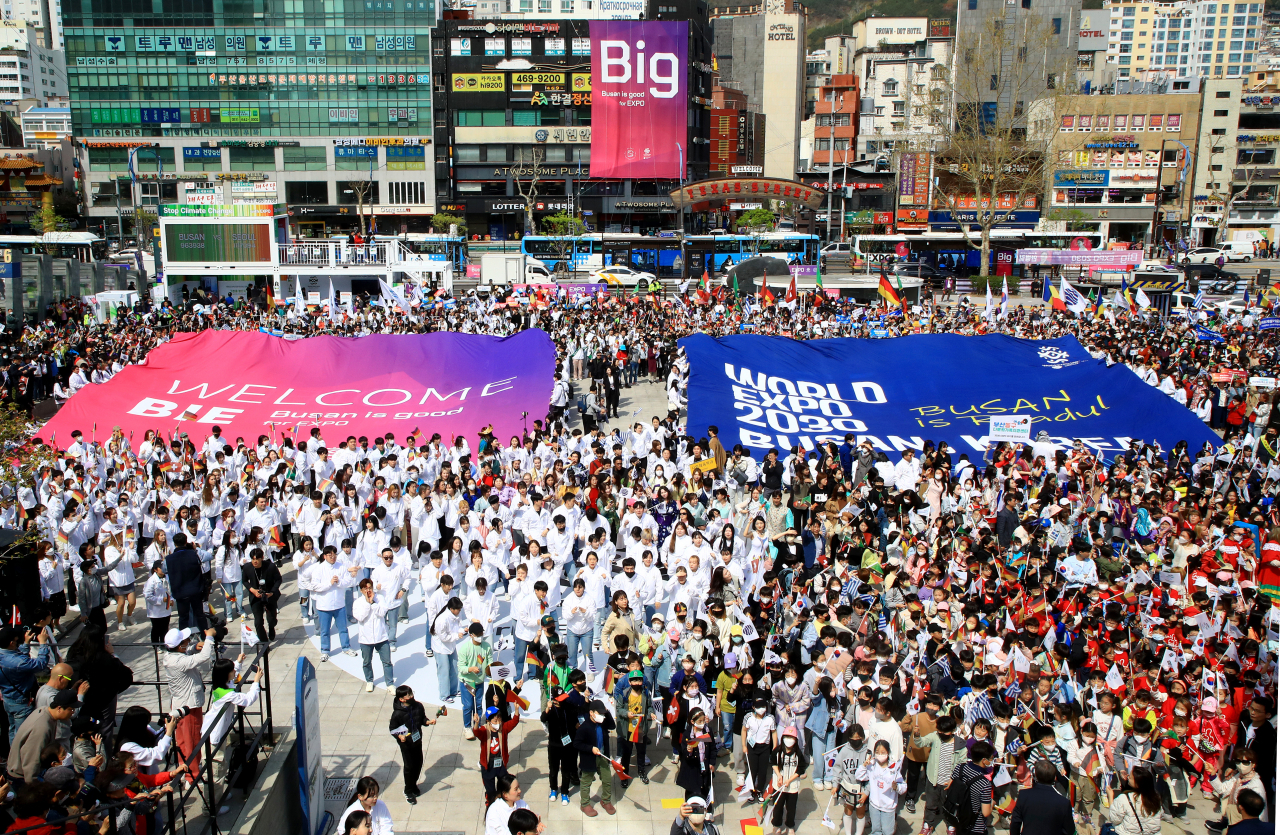Busan could generate W60tr as host of 2030 World Expo
By Lee Yoon-seoPublished : April 4, 2023 - 16:07

Competition is fierce for countries around the world to win the bid to host the 2030 World Expo -- not only would the event significantly raise a nation's status, but it could also potentially provide a huge boost to the region's economy and the domestic business ecosystem.
According to research conducted by South Korea's 2030 Expo Bid Promotion Headquarters, if Busan wins the contest to host the event, the country will be able to raise more than 60 trillion won ($45 billion) during the expo time period -- with some 34.8 million tourists expected to visit Busan over the course of six months.
The event would induce production worth 43 trillion won while generating 18 trillion won in added value -- and over 500,000 jobs are expected to be created for the successful hosting of the event.
Officials also add that a substantial amount of long-term, international investments would take place in the years leading up to the opening of the expo.
"Other major international events such as the World Cup and the Olympics mostly generate economic benefits by broadcasting games or posting industries' advertisements, but in the case of World Expos, they are held for six months -- and they require vastly complicated development processes (including various investments compared to the World Cup and Olympics)," said Cho You-jang, the director general of 2030 Expo Bid Promotion Headquarters under the Busan Metropolitan Government, during a presentation held for the press on March 21.
"If Busan gets to host the World Expo, we expect some 2 trillion won in direct investments just for the construction process," he said, adding that the 2030 World Expo would ultimately generate three to five times the economic benefits that the Olympics and World Cups usually do.
According to Cho, World Expos would further contribute significantly to Korea's gross domestic product, gross value added and the gross regional domestic product -- which refers to the aggregate of GVA of all resident producer units in the region.
In fact, a year after the closing of the World Expo 2020 Dubai, a report from an international accounting firm Ernst & Young found that the economic impact of the expo is expected to contribute a total of $42.1 billion of GVA to the economy of the United Arab Emirates, from 2013 to 2042.
Economic revolutions led by Korea, centering on commercialization of domestic state-of-the-art technologies will further take place following Busan's hosting of the World Expo.
"Elevators, phonographs and phones were all the inventions that rose to global products after they were introduced in World Expos -- and, with Busan's hosting of the World Expo, Korea's state-of-the-art technologies will be greatly publicized to the globe," said Cho during the presentation.
Experts are hopeful that should Korea host the World Expo, the country would see more than three times the economic benefits it saw when Korea hosted the 2012 Yeosu Expo.
The 2012 Yeosu Expo, which was held in 2012 for three months from May 12 to August 12, generated a total 18 trillion won in economic benefits with 8.2 million visitors. The generated income stemmed mainly from tourism, large-scale civil engineering works and transportation system constructions.
As Busan aims to host the World Expo, which differs from the Yeosu Expo in both scope and scale, the country is hopeful that it can win the race between Busan, Riyadh, Odesa and Rome to become the seventh country in the world to have the privilege of hosting the World Cup, the Olympics and the World Expo.





![[From the Scene] Monks, Buddhists hail return of remains of Buddhas](http://res.heraldm.com/phpwas/restmb_idxmake.php?idx=644&simg=/content/image/2024/04/19/20240419050617_0.jpg&u=20240419175937)




![[Graphic News] French bulldog most popular breed in US, Maltese most popular in Korea](http://res.heraldm.com/phpwas/restmb_idxmake.php?idx=644&simg=/content/image/2024/04/18/20240418050864_0.gif&u=)




![[From the Scene] Monks, Buddhists hail return of remains of Buddhas](http://res.heraldm.com/phpwas/restmb_idxmake.php?idx=652&simg=/content/image/2024/04/19/20240419050617_0.jpg&u=20240419175937)

![[KH Explains] Hyundai's full hybrid edge to pay off amid slow transition to pure EVs](http://res.heraldm.com/phpwas/restmb_idxmake.php?idx=652&simg=/content/image/2024/04/18/20240418050645_0.jpg&u=20240419100350)

![[Today’s K-pop] Illit drops debut single remix](http://res.heraldm.com/phpwas/restmb_idxmake.php?idx=642&simg=/content/image/2024/04/19/20240419050612_0.jpg&u=)